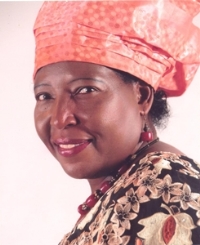Transforming international aid – a vital role for a Welsh institution

Dr Florence Wambugu
14 October 2011
Leading African scientist launches new partnership strategy at the House of Commons
A centre of excellence in Wales has a vital role to play in transforming aid to developing countries in Africa, according to one of the leading scientists in the field.
Its work is even more important during the economic downturn when countries have to be more accountable and open about their foreign aid programmes, says Dr Florence Wambugu, founder of the leading African agricultural development NGO, Africa Harvest.
Dr Wambugu will visit Wales for two days to talk to pioneering researchers at Aberystwyth University’s Institute of Biological, Environmental and Rural Sciences (IBERS) on Wednesday 19 and Thursday 20 of October.
She will also help launch the Institute’s International Strategy for Development in the House of Commons on Tuesday 18 October, with Mark Williams MP in the company of former UK Ambassador to the United Nations, Sir Emyr Jones Parry, who is President of the University and the new Vice Chancellor, Professor April McMahon.
As founder and chief executive of Africa Harvest, which works from four offices in Africa and north America, her address will be called, ‘Building Partnerships for International Agricultural Development’.
She stresses the need for the kind of partnerships already taking place between IBERS and Africa Harvest so that aid is delivered through local organisations, with more democratic control to ensure that the support reaches the target communities.
Her backing has been welcomed by Professor Wayne Powell, Director of IBERS. “Florence Wambugu’s support underlines our commitment to using world class scientific research to improve the lives of people across the world.
“Like Florence Wambugu, we believe in moving science from the lab to the market for the benefit of local farmers and local communities.”
Global solutions – Florence Wambugu’s views
“This crisis has made us all realise how connected and interdependent the world has become,” says Florence Wambugu. “It has also made us realise that global challenges will need global solutions, and that the African hunger, poverty and malnutrition crisis is truly a global crisis.
“In light of limited aid budgets, greater accountability with regards to how aid is spent becomes even more critical; Europe needs to consider a system founded upon the principles of accountability and transparency.
“We believe institutions such as the IBERS, a world class award winning research and teaching centre at Aberystwyth University, provide part of the answer to future European assistance to developing countries, and more specifically, Africa.
“Partnering with developing-country grass root organisations such as Africa Harvest, European institutions such as IBERS are the ideal vehicles of driving technology transfer to address some of the biggest challenges related to poverty, hunger and malnutrition.
“Strong and innovative partnerships can help maximize aid assistance in a democratic, accountable and transparent way. Organisations such as Africa Harvest partnering with IBERS can help identify local stakeholders, analyse critical issues and gaps for delivery of impact and unlock maximum value from aid assistance.”



